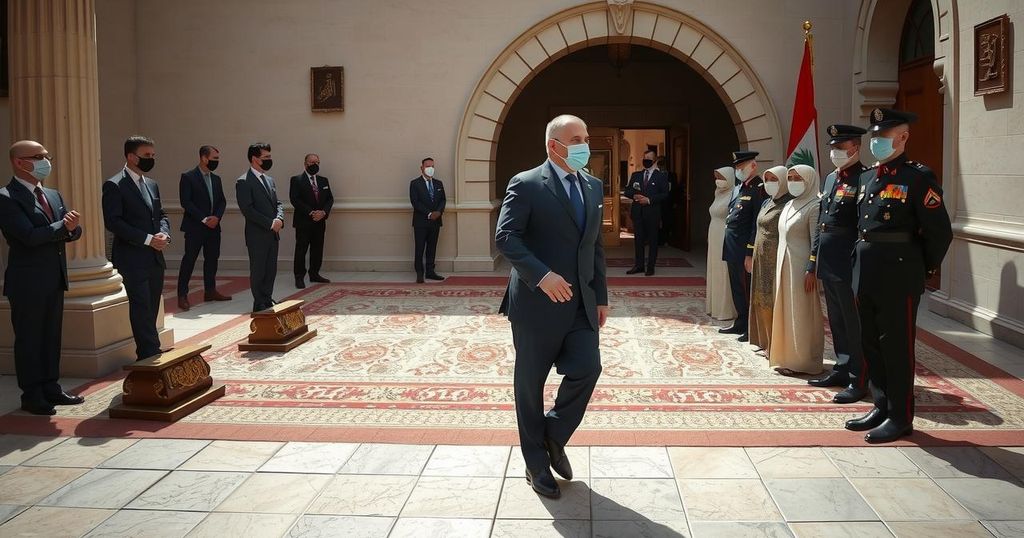Lebanon’s Caretaker PM to Visit Syria for Historic Diplomatic Meeting

Lebanon’s caretaker PM Najib Mikati will meet Syria’s de facto leader Ahmed al-Sharaa in Damascus, marking the first Lebanese governmental visit to Syria in 15 years. This visit is seen as a pivotal opportunity for renewed dialogue and cooperation between the two countries, historically characterized by complicated relations. Prime Minister Mikati’s meeting could signal a shift towards improved ties and addressing past grievances.
Lebanon’s caretaker Prime Minister Najib Mikati is scheduled to visit Damascus on Saturday, where he will meet with Syria’s de facto leader, Ahmed al-Sharaa. This meeting marks a significant political event, as it will be the first visit by a Lebanese head of government to Syria’s capital in 15 years and the first since the Assad regime’s collapse. Mikati’s visit is seen as an opportunity for renewed dialogue and potential cooperation between the two neighboring countries, which have historically maintained complex and often strained relations.
Mikati has received a formal invitation from Sharaa to visit, marking a potential shift in Lebanese-Syrian diplomatic ties. Caretaker Lebanese Foreign Minister Abdallah Bou Habib is expected to accompany Mikati and has expressed hopes for improved neighborly relations. The context of this encounter is further underscored by Lebanon’s new president, Joseph Aoun, who advocates for “a serious and equal dialogue” with Syria. The long-standing influence of Syria in Lebanon, particularly during the Assad family’s rule, remains a contentious point between the two nations.
Historically, the relationship between Lebanon and Syria has been fraught with animosity and manipulation. Syria’s military presence in Lebanon spanned almost three decades until its withdrawal in 2005, following significant unrest sparked by the assassination of former Lebanese Prime Minister Rafik al-Hariri, which led to mass protests in Lebanon. Although Syria has since denied involvement in the assassination, the fallout created a lasting impact on Lebanese politics.
The visit by Mikati, the first by a Lebanese premier since Saad al-Hariri’s trip in 2010, may signify a renewed willingness to engage in dialogue, especially in light of Sharaa’s commitment to non-interference in Lebanese affairs. The lingering effect of Hezbollah’s support for Syria during its civil war adds another layer of complexity to the ongoing dynamics of Lebanese sovereignty and Syrian influence in the region.
It remains to be seen how this visit will shape future relations and whether it indeed represents a turning point in Lebanese-Syrian diplomacy after years of tension and mistrust.
The political relationship between Lebanon and Syria has been historically complex. Lebanon gained independence from France in the 1940s, while Syria has often exerted influence over Lebanon due to geographical proximity and historical ties. Syria maintained a military presence in Lebanon from 1976 until its withdrawal in 2005 after the fallout from the assassination of Rafik al-Hariri. This longstanding interference has left enduring tensions, especially as factions within Lebanon, like Hezbollah, align with Syrian interests. More recently, changes in leadership and the effects of regional conflicts have opened opportunities for dialogue between the two countries, exemplified by the forthcoming meeting between Mikati and Sharaa.
In conclusion, Prime Minister Najib Mikati’s upcoming visit to Damascus symbolizes a potential thaw in the historically strained relationship between Lebanon and Syria. It presents an opportunity for dialogue that could reshape bilateral ties and address lingering issues of influence and cooperation. The meeting’s significance is heightened by the legacy of Syria’s prolonged involvement in Lebanon’s political landscape and the current dynamics influenced by regional conflicts.
Original Source: www.newarab.com








